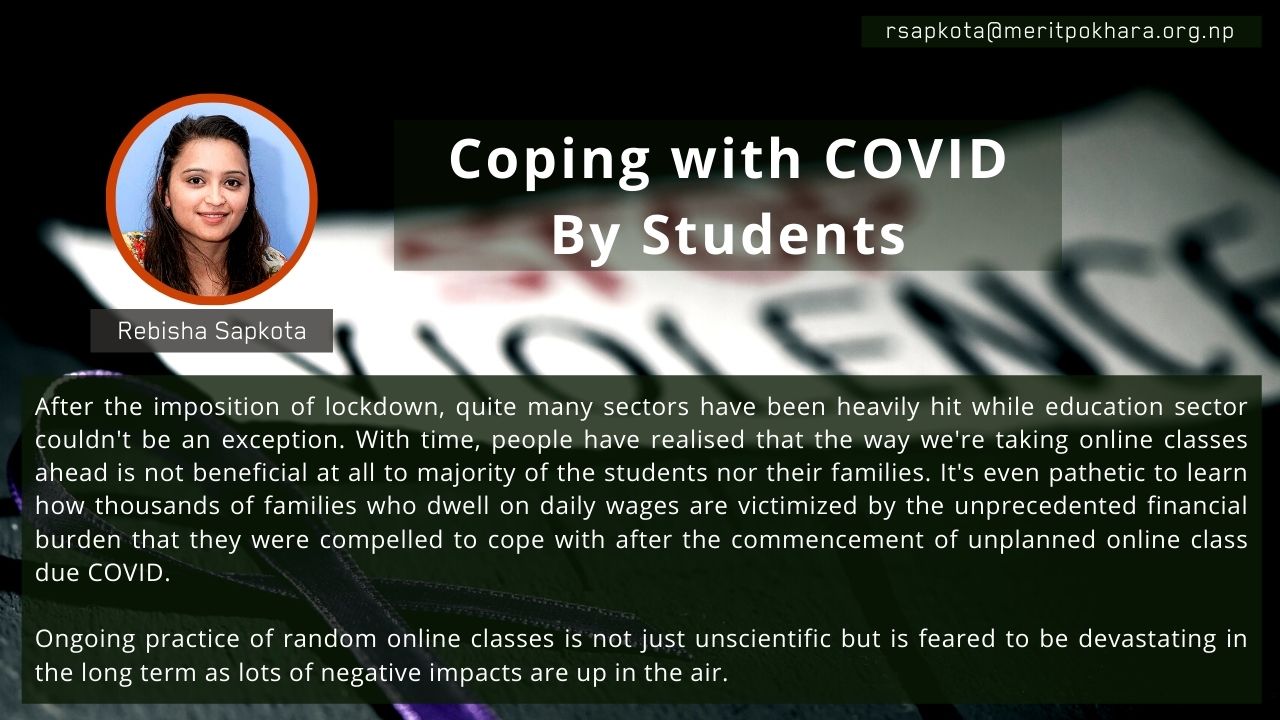The numbers of COVID-19 cases across the country are rising exponentially day by day. The longer this crisis continues, the worse it is going to impact the economy and our livelihoods. According to the World Bank, Nepal faces the risk of nearly one-third of the population who are just above the poverty line could fall below the line due to the loss of livelihood caused by the covid-19 pandemic. According to the Nepal development update, 31.2% of the Nepal population who live close to the poverty line are at high risk of falling into extreme poverty. In Nepal, the 1st phase of lockdown was between 11th Chaitra 2076 B.S. to 2077 Shrawan and now the 2nd wave of the coronavirus has affected Nepal. Due to the increased severity of the mutated strain of Covid-19, the government has imposed the 2nd phase of lockdown from 2078 Baisakh 15.
A huge sector that has been impacted greatly, one of such sectors is the education sector.
In Nepal, virtual classes, virtual exams have commenced in some places while some exams have already been canceled. Many students have been in the same class for more than 2 years due to which huge psychological problems have risen. Parents are demanding that private schools should not hike their fees. On the other hand, schools say that they do not have money to pay the staff and teachers. Some schools stopped teaching entirely while others resorted to online classes. Online classes are a great solution for some in this time of crisis for a short run, however, are not convenient to all people. What about people that do not have internet facilities?
According to Nepal telecommunication Authority (NTA) In FY 2077/78 of 8 months (Shrawan to Falgun) internet access in Nepal has reached 87.19% of the total population and most of them are from urban areas. So, what would other people do? They cannot attend online classes. The problem exacerbates when you realize that several families out of these run their daily affairs through the day-to-day earnings. They have lost their livelihoods after the lockdown. Think about what such families would do, neither would they have money to send their children to school/join online classes nor would they want their children to go to school because they would want them to go to work to bring some money home.
The 2019-20 data shows that boys in villages dropped out of school midway reasons being financial constraints in their families. When schools, colleges reopen the children of elite families will go back to school but the children from poor families will not be able go back to school. They would be pushed into child labor. This is the long-term problem that would be created but not a lot of people are talking about it. The impact of COVID19 on education has few positive outcomes apart from the many negative aspects.
Merits
Less consumption of junk food.
Students can learn new skills.
All the students can study at their speed comfortably, enough time can be contributed to each subject.
Demerits
1. Time table of students has been disrupted.
Earlier students used to get up early to go to school and go to bed timely but the lockdown has broken this schedule which has resulted in disturbed sleep break cycle making students less active, attentive, punctual and disciplined.
2. Decreased physical activities
Due to lockdown students sit inside the room and play mobile games, no physical activities like exercise are done.
3. Mental problem
Due to the lockdown increase in the emotions of anger, irritability, loneliness, hopelessness, fear, frustration, etc.
4. Not getting exposed to proper sunlight and air (fresh environment)
Vitamin D deficiency is a lack of sunlight exposure. Vitamin D helps keep our immune system strong, so a deficiency could be the reason for frequent colds or the flu. Without enough sun exposure, our serotonin levels can dip. Low levels of serotonin are associated with a higher risk of major depression.
5. Lack of concentration and attentiveness.
The presence of the teacher keeps students attentive and hence helps in concentration better;but now they are not getting this environment.
6. Students are not able to meet peers
Due to lockdown, there is no motivation among students. Students learn from their batch mates and have healthy competition which helps them do better; but it's not possible now.
7. More screen time
Too much screen time can impair brain structure and function. It can cause obesity, insomnia, mood swings, academic problems, etc.
Prevention
Take care of your mental health by staying connected to friends, families, maintaining a healthy lifestyle, and staying positive.
Do exercise, yoga, and meditation.
Read books and write articles, stories. Keep yourself productive.
Learn new skills
Clean house, surroundings, and increase daily physical activity.
conclusion
The year 2020/21 is going most remarkable period of the 21st century.Millions of people deaths all over the world and degraded economy of countries. The educational sector also one of the most affected sectors. we all know that online education can never replace the traditional educational system Moreover digitalised learning gave birth to a new kind of discrimination between those who have access to the internet and those who did not have but apart from Certain challenges and looking at the current situation online studying is the only option available to the student.
 Rebisha Sapkota
Rebisha Sapkota